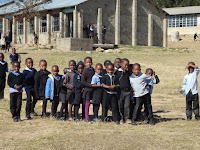 |
| Grade 4 students work on a decision making scenario. |
The school year in Lesotho begins in
late January or early February. In addition to a short break for
Easter, students get around six weeks off between the end of June and
early August. Then, the second second semester runs from early August
until exams are completed in late November with a week off just
before Independence Day, which is October 4.
Beginning in February, I have been
going to the local primary school on a weekly basis to co-teach Life
Skills with the teachers. We are teaching grades 4, 5, 6, and 7 life
skills in 40 minute blocks. Every time I visit, I see a over 150
students in the four sessions. While the classes for grades 4 and 7
are relatively small, with 27-31 students; grades 5 and 6 are more
than double those numbers. This makes planning their lessons a bit
trickier.
 |
| Young students say goodbye after I complete my classes. |
One of my favorite things about
visiting the school each week is the excitement with which the
students and even the faculty greet me. They are always thrilled when
I arrive, even those that I do not teach! As I approach the school,
my arrival is heralded by calls of “Ausi Thato! Buh-bye, Ausi
Thato!” as most children do not realize there are different words
for hello and goodbye in English. Similarly, every time I pass
between classes or begin my departure, I hear a chorus of voices
calling my name and waving. It is a good thing the teachers also like
me or they would begin to resent the exciting distraction that is me!
It has been truly eye opening to
interact with students in the classroom. Schools here in Lesotho have
a much different methodology than what is touted in American
classrooms. Corporal punishment is acceptable and used when students
commit any number of infractions including refusing to answer or
answering even answering incorrectly, because students are used to
this, it can be harder to use the usual engagement methods I adopted
during my decade of experiential education in America. It also makes
students more reticent to speak up if they are uncertain their answer
is correct. Students who arrive at my school late are expected to
remain standing at their desks for duration of school that day. I
have even been offered a stick by a teacher, just in case I needed
it.
 After speaking with the principal and
teachers to determine how I could be of use at the school, I was
mentally prepared to teach in mostly English with occasional Sesotho
for harder concepts. By the end of primary school, students are
expected to be able to learn in English only. Unfortunately, my
English accent can be hard for students to understand and many simply
do not try. As a result, I often find myself teaching in both English
and Sesotho. This is great for improving my Sesotho, although I worry
I am doing the students a disservice as they will learn in only
English if they go on to high school or secondary school.
After speaking with the principal and
teachers to determine how I could be of use at the school, I was
mentally prepared to teach in mostly English with occasional Sesotho
for harder concepts. By the end of primary school, students are
expected to be able to learn in English only. Unfortunately, my
English accent can be hard for students to understand and many simply
do not try. As a result, I often find myself teaching in both English
and Sesotho. This is great for improving my Sesotho, although I worry
I am doing the students a disservice as they will learn in only
English if they go on to high school or secondary school.
We have adapted to each other well over
the course of the school year and now I eagerly prepare my lesson
plans in things like communication, decision making, creativity, and
sexual and reproductive health. I was particularly excited when I
recently spoke with the principal and grade 7 teacher about covering
sexual and reproductive health. The school is Catholic and I worried
they would frown on the idea of teaching the subject. The principal,
however, agreed it was a vital topic as the students would soon be
going to school with children from other villages and “they might
be bad children.”
 |
| Grade 7 playing Condom Time Bomb to the tune of "Let's Talk About Sex." |
As a result, my last few lessons of the
year focused on the importance of the ABCs: abstinence, being
faithful to one partner, and using condoms as well as the science of
HIV and how to prevent infection. We discussed questions the students
asked anonymously via a question box left in the classroom and
debunked misconceptions about HIV. These were definitely some of my
favorite life skills classes thus far, especially since they are so
vital to the students' safety in the next two decades of their life.
Here in Lesotho, most people contract HIV between 15 and 35 through
unprotected sex. The HIV positive rate actually doubles in under two
decades!
 |
| With the grade 7 students. |
 |
| Condom "balloons" filled with questions for Condom Time Bomb! |
No comments:
Post a Comment